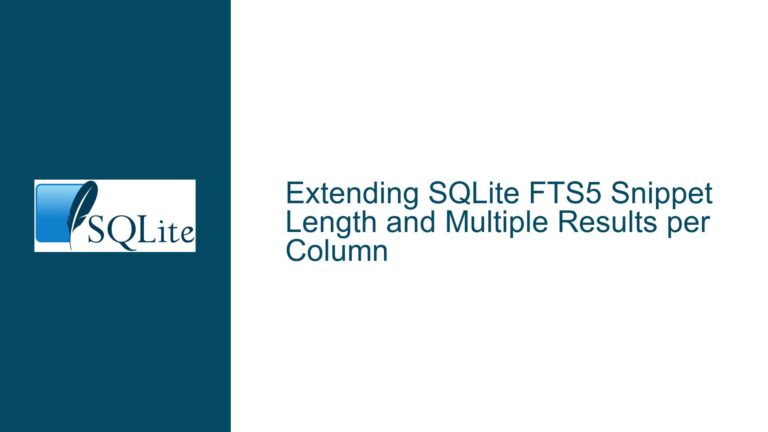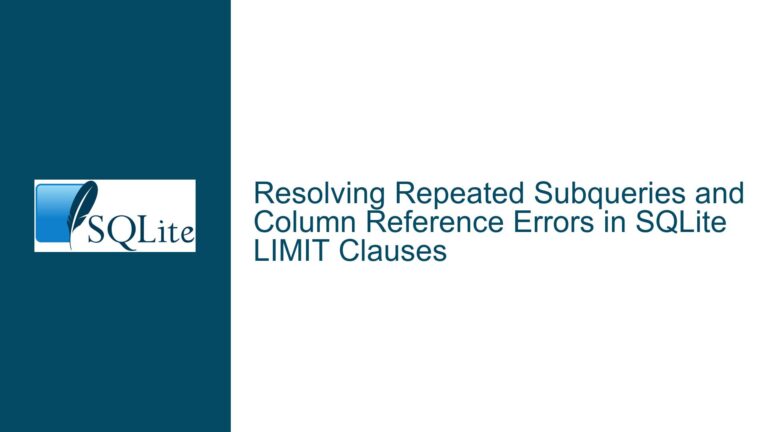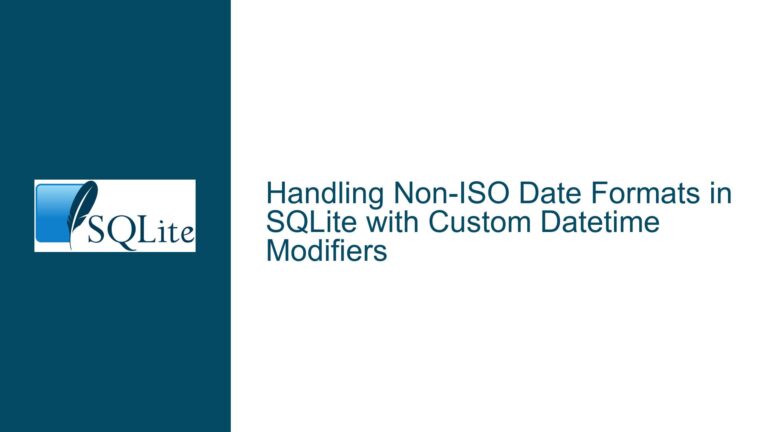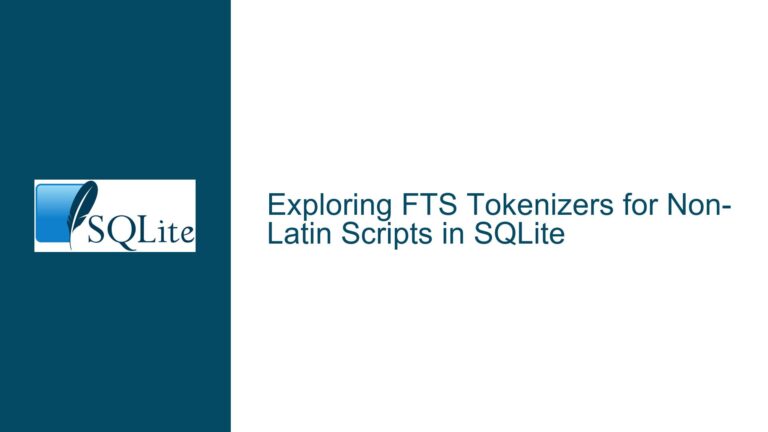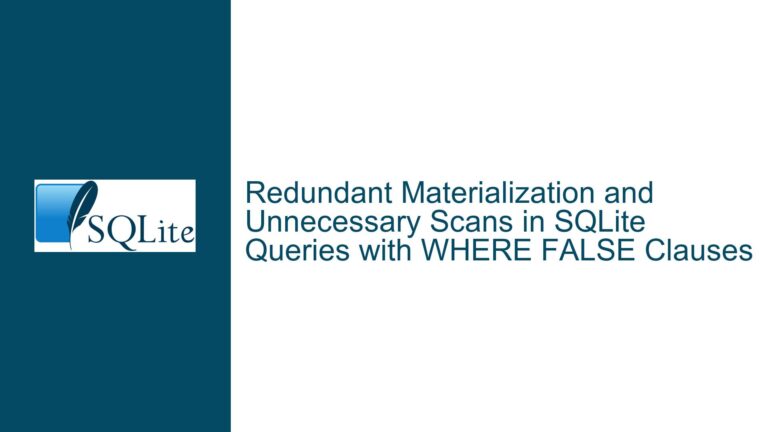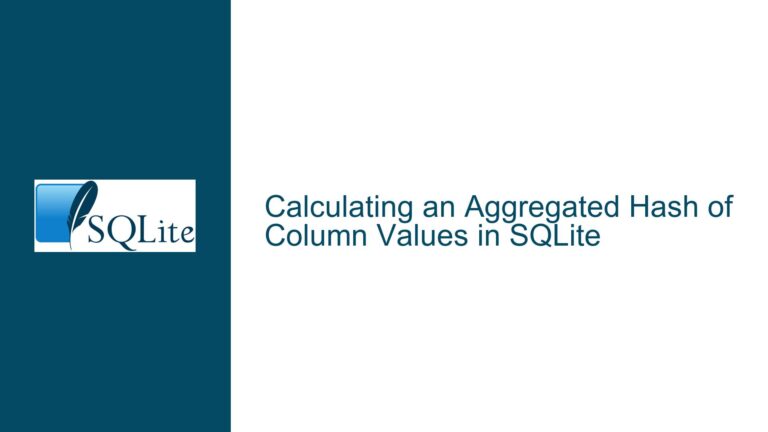Resolving Schema Ambiguity and SQL Parsing in SQLite Attached Databases
Schema Search Order and Table Resolution in SQLite Attached Databases
SQLite allows attaching multiple database files to a single connection using the ATTACH DATABASE command. Each attached database is assigned a schema name (e.g., main, temp, aux1). When an SQL statement references an unqualified table name (e.g., tbl instead of schema.tbl), SQLite resolves the table using a predefined search order: temp, main, followed by attached databases in the order they were attached. This search order is critical for understanding which schema will be prioritized when duplicate table names exist across schemas.
The pragma_table_list table-valued function returns metadata about tables across all attached schemas. A key question arises: Does pragma_table_list return rows in the same order as SQLite’s schema search hierarchy? If true, developers could use this ordering to programmatically determine which schema an unqualified table reference resolves to. However, SQLite documentation does not explicitly guarantee this ordering, creating ambiguity. Relying on implicit ordering risks breakage if future SQLite versions change internal implementation details.
The schema resolution process becomes more complex when applications dynamically construct SQL statements. Consider a scenario where a developer needs to rewrite table references in a provided SQL statement to include explicit schema qualifiers. This requires knowing which schema each unqualified table belongs to based on the search order. Manual parsing of SQL statements to extract table names is error-prone due to SQL’s syntactic complexity (e.g., handling quoted identifiers, CTEs, subqueries).
Limitations of Pragmas and SQL Parsing in Dynamic SQL Manipulation
Three primary challenges emerge when attempting to analyze and modify SQL statements programmatically:
Undocumented Pragma Ordering Guarantees: While
pragma_database_listreturns attached databases in attachment order,pragma_table_listlacks explicit ordering documentation. The original approach attempted to join these pragmas to correlate table existence with schema priority, but this creates fragile code dependent on undocumented behavior.SQL Syntax Complexity: Direct string manipulation of SQL statements fails to account for:
- Nested subqueries and common table expressions (CTEs)
- Views that indirectly reference tables
- Aliased table references
- Compound SELECT statements with UNION/INTERSECT
- Window functions and aggregate expressions
Schema Dependency: Accurate SQL analysis requires access to the current database schema to resolve:
- Table existence across multiple attached databases
- Column names for
SELECT *expansion - VIEW definitions
- Temporary table visibility
Traditional approaches like regular expression matching or naive string splitting often produce false positives/negatives. For example, a regex searching for FROM tbl would incorrectly match string literals containing that text or fail to handle quoted identifiers like FROM "tbl" or FROM [tbl].
Implementing Robust Schema Detection and SQL Transformation
Solution 1: Bytecode Virtual Tables with tables_used
SQLite’s tables_used virtual table provides direct insight into schema resolution when compiled with -DSQLITE_ENABLE_BYTECODE_VTAB:
-- Example usage with dynamically bound table name
SELECT schema, tbl_name
FROM tables_used('SELECT * FROM ' || :table_name);
Implementation Steps:
- Compile SQLite with Bytecode VTAB Support:
CFLAGS="-DSQLITE_ENABLE_BYTECODE_VTAB" ./configure make - Execute Target Statement Through tables_used:
CREATE TEMP TABLE analysis AS SELECT * FROM tables_used(:input_sql); SELECT schema, tbl_name FROM analysis WHERE type='table' AND sql IS NULL; - Handle Qualified vs Unqualified Names:
-- Returns schema even for qualified references SELECT CASE WHEN instr(normalized_sql, '.') > 0 THEN substr(normalized_sql, 1, instr(normalized_sql, '.')-1) ELSE (SELECT schema FROM analysis WHERE tbl_name = :table LIMIT 1) END AS resolved_schema FROM tables_used(:input_sql);
Advantages:
- Direct access to SQLite’s internal name resolution
- Handles all SQL syntax variants supported by SQLite
- Returns exact schema/table pairs used in the statement
Limitations:
- Requires custom SQLite build
- Doesn’t expose column-level dependencies
- Requires statement validation before analysis
Solution 2: SQLite Authorizer Callback
The sqlite3_set_authorizer function provides real-time notification of database objects accessed during statement preparation:
int authorizer_callback(
void* user_data,
int action_code,
const char* param1,
const char* param2,
const char* db_name,
const char* trigger_name
) {
if(action_code == SQLITE_READ){
printf("Access to table %s in schema %s\n", param1, db_name);
}
return SQLITE_OK;
}
sqlite3_set_authorizer(db, authorizer_callback, NULL);
Implementation Strategy:
- Register Authorizer Before Preparation:
# Python example using APSW def authorizer(action, p1, p2, db, trigger): if action == apsw.SQLITE_READ: print(f"Table {p2} accessed in schema {db}") return apsw.SQLITE_OK connection.setauthorizer(authorizer) - Capture Schema/Table Pairs:
- Collect all
SQLITE_READactions with non-NULL db_name - Map aliases to original tables using parse trees
- Collect all
- Modify Statement Using Captured Metadata:
# Replace unqualified references with schema-qualified modified_sql = re.sub(r'\b(tbl)\b', 'main.tbl', original_sql)
Advantages:
- Works with standard SQLite builds
- Provides granular access control
- Captures indirect accesses through views/triggers
Limitations:
- Requires low-level language integration (C/Python)
- Doesn’t provide full parse tree for modification
- Callback happens during preparation, not before
Solution 3: Hybrid Parsing with Pragmas
For environments where recompiling SQLite isn’t feasible, combine pragma_table_list with schema priority sorting:
WITH db_priority AS (
SELECT
name,
ROW_NUMBER() OVER (ORDER BY
CASE WHEN name='temp' THEN 0
WHEN name='main' THEN 1
ELSE seq + 2 END) AS search_order
FROM pragma_database_list()
),
table_schemas AS (
SELECT schema, name AS tbl_name
FROM pragma_table_list(:table_name)
WHERE name = :table_name
)
SELECT ts.schema
FROM table_schemas ts
JOIN db_priority dp ON ts.schema = dp.name
ORDER BY dp.search_order
LIMIT 1;
Implementation Notes:
- Explicitly defines schema priority using
pragma_database_listordering - Joins with
pragma_table_listto check table existence - Uses window function to establish search order
Performance Considerations:
- Create indexes on
sqlite_schematables:CREATE INDEX temp.sqlite_temp_master_name ON sqlite_temp_master(name); CREATE INDEX main.sqlite_master_name ON sqlite_master(name); - Cache database_list results when handling multiple statements
Advanced Scenario: Schema-Qualified Statement Rewriting
To automatically qualify all table references in an SQL statement:
- Extract Table References using
tables_usedor authorizer - Resolve Schema Priority using the hybrid approach
- Apply Text Replacements with consideration for:
- Existing qualified names
- CTE names that shadow table names
- Subquery scope
- Trigger context
Example replacement algorithm in pseudocode:
for each table in tables_used:
if table is unqualified:
find schema using priority order
new_name = schema.table
replace all occurrences not in:
- string literals
- identifier quotes
- CTE definitions
Edge Case Handling:
- Aliased tables:
FROM tbl AS t→FROM main.tbl AS t - Schema-qualified joins:
JOIN aux.tblremains unchanged - Subquery references: ensure replacements don’t cross subquery boundaries
Debugging Techniques
- View Expanded SQL using
EXPLAIN:EXPLAIN SELECT * FROM tbl; -- Look for OpenRead opcodes showing schema numbers - Check Schema Attachment Order:
SELECT name, seq FROM pragma_database_list; - Validate Virtual Table Availability:
SELECT * FROM sqlite_master WHERE type='table' AND name='tables_used';
Performance Optimization
- Cache Schema Maps: Store schema priorities and table locations in memory
- Batch Analysis: Process multiple statements in single
tables_usedquery - Prepared Statement Reuse: Cache qualified SQL versions for common statements
Security Considerations
- Injection Prevention: Use parameterized queries when constructing analysis SQL
- Schema Isolation: Restrict attachment to trusted databases
- Access Control: Implement authorizer callback to limit schema visibility
Cross-Version Compatibility
- SQLite 3.37+: Required for
pragma_table_list - SQLite 3.16+: Required for
pragma_database_listseq column - Legacy Support: Fallback to
sqlite_masterqueries for older versions
Alternative Approaches
SQL Parse Libraries:
- sqlparse (Python): Tokenize SQL without full validation
- libpg_query (C): PostgreSQL parser adapted for SQLite
- ANTLR Grammars: Custom SQLite parser implementation
Proxy Modification:
- Intercept SQL statements before execution
- Use combination of pragmas and regular expressions
- Maintain mapping of unqualified to qualified names
View-Based Resolution:
CREATE VIEW temp.qualified_tbl AS SELECT * FROM main.tbl; -- Use view substitution in SQL statements
Final Recommendations
For SQLite >=3.37 with Bytecode VTAB:
- Prefer
tables_usedapproach for accuracy - Combine with authorizer for complete dependency tracking
- Prefer
For Standard SQLite Builds:
- Use authorizer callback with schema priority CTE
- Implement caching for performance-sensitive applications
When Modifying SQL:
- Always validate modified statements with
PREPARE - Use EXPLAIN to verify schema usage
- Test with edge case queries containing:
- Nested subqueries
- Compound queries
- Temporary tables
- Attached database cycles
- Always validate modified statements with
This comprehensive approach ensures reliable schema resolution while accounting for SQLite’s internal behaviors and providing multiple implementation strategies tailored to different environments and requirements.

